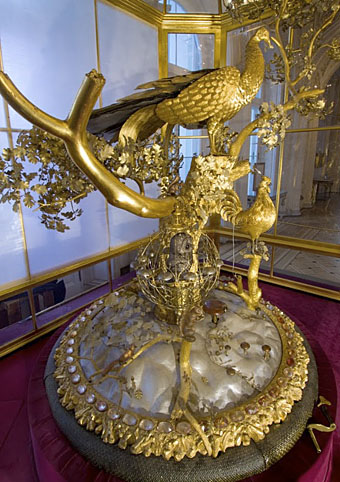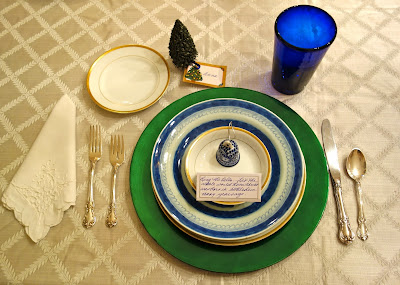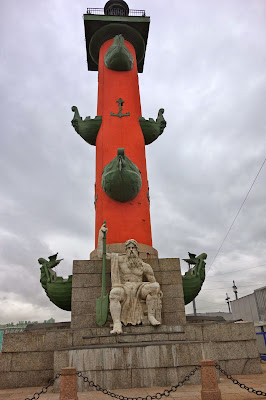I dubbed St. Petersburg, the-city-I-couldn't-wait-to-leave, but the city hasn't left me. I can still see in my mind's eye the clashing opulence of the bourgeoisie palaces juxtaposed to the drab gray, utilitarian proletariat apartments. These extremes made St. Petersburg a depressingly uncomfortable, yet provocative place to visit.
From the time we got on the ship taking us from Helsinki, Finland to St. Petersburg, Russia we noted an Attitude with a capital A. Obviously, the Russian help desk employees on board ship had never had to please customers. I guess if the state equally distributes regardless the value of your contribution, it doesn't matter how you treat the public. The ship's dining room hostesses and ticket window clerks shared the same Attitude.
Maybe their anger was caused by the gray and foreboding weather in St. Petersburg.
Thankfully, our Russian tour guide for the day was a kind, pleasant, and caring lady. The first sights she showed us were two red light houses featuring mythical figures. They were as foreboding as the sky and set a somber tone for the day.
On our city tour, as we crossed many of the city's 365 bridges, our guide told us that Peter the Great built his capital on a swamp because he knew Russia needed a southern harbor to maintain year around commerce. Many of the bridges are intricate iron masterpieces left over from another era.
We stopped and snapped pictures of the ornate Church of Spilled Blood. However, the confection was shrouded when we heard that it was the grizzly scene of a czar's assassination.
Next we detoured to a tourist shop for coffee and a break. When my husband and I came out of our respective restrooms, we were both chuckling. He found this sign above his sink.
Meanwhile, in the ladies' room above the toilet paper dispenser a similar sign read, "Do not place toilet paper in toilet." St. Petersburg was living up to my stereotype of a decaying Soviet city.
Back on the road, our van continued winding past a military museum surrounded by rusting tanks and many gray decrepit apartment buildings. Then we came to a park where we disembarked and walked about a block to the Hermitage Museum. Its bright turquoise, white, and gilded exterior seemed completely out of place.
I was anxious to see inside, because the Hermitage is home to the world's largest collection of paintings, and one particular masterpiece.
Entering the museum, we waited in the ticket line to give the clerk our vouchers. When we reached the front of the line, she growled in broken English, "Wrong line."
We patiently waited in another line. Finally, this clerk informed us that we didn't need a ticket, because one day each month was a "free entry" day. Hm, why hadn't the first clerk given us that piece of information?
Just happy to be inside, we began a self-guided tour using the headphones available at another desk. Of course, many of the rooms did not have numbers and often when there were numbers, they did not correspond with the printed guidebook. However, we somehow managed to see much of the magnificent palace.
Catherine the Great had this palace built to showcase her collections. Among the nearly three million items is this solid gold throne,
many well-preserved artifacts,
and priceless works of art such as the gold peacock clock.
 |
| http://www.johncoulthart.com |
All of these extravagantly-valuable objects are displayed in equally opulent surroundings. Ceilings are intricate and beautiful.


Floors are elaborately inlaid.

Furthermore, Catherine did not forget lighting
or wall coverings.
Of course, supporting columns are highly ornamental.
Walking among the over-the-top inventory and decor, I spied a garden out the window. The simple orderly display of nature was a quiet and lovely foil to the opulence. Purportedly, Catherine found it a respite as well.
To me, this garden complimented the masterpiece I came to see. Rembrandt's Return of the Prodigal Son isn't garish; it is warm and welcoming.
When I taught college writing courses, I used this painting to illustrate how a controlling idea unifies a work of art. In Rembrandt's masterpiece the father's loving forgiveness is the controlling idea. I was mesmerized by his use of color, figure placement, and lighting to focus not on the prodigal son nor the elder brother, but on the lavish, profligate, and prodigal love of the father.
The masterpiece's sentiment followed me as we left the Hermitage. I savored the mood as we walked in front of the ornate palace gates
and past a horse drawn carriage that looked like a the movie prop for Anna Karenina.
The mood was dispelled, however, as the mist turned to drizzle and two Russian guards reminded me of where I was.
Across the enormous cobblestone courtyard, I kept scanning the crowd for our tour guide. Finally, she found us through the drizzle.
Whew, I let out a relieved sigh as we climbed into the van. It was identical to dozens upon dozens of other vans on the traffic-clogged city street. How would we have found our way back to the harbor without this kind Russian lady? I didn't want to think about it. I was just happy to sink back into the hard seat and let it take us back to the ship.
I didn't shed any tears that evening as we sailed out of the bleak, cold Russian waters.
Yet, the city of opulence and oppression has lingered in my mind. Undoubtedly the profligacy of the czars produced the revolution, but the Soviet system hasn't produced a happy and efficient society either.
Interestingly, Rembrandt painted both extremes. The impoverished, rag-tag younger brother was opposed by the arrogant, well-heeled elder brother. Who could bring the two conflicting sides together? The forgiving father. He ran to meet the returning prodigal, and he came out to urge the pouting elder brother to join the party. Both sons merely had to humble themselves and accept the warm embrace of their generous and lavish father.

















































